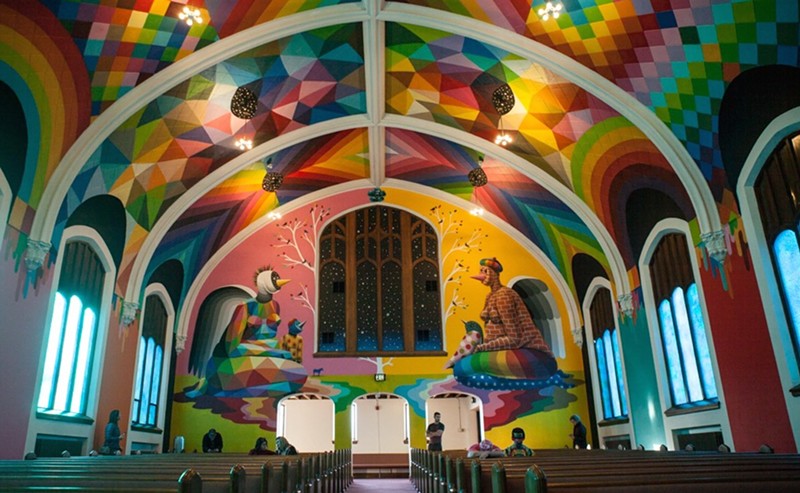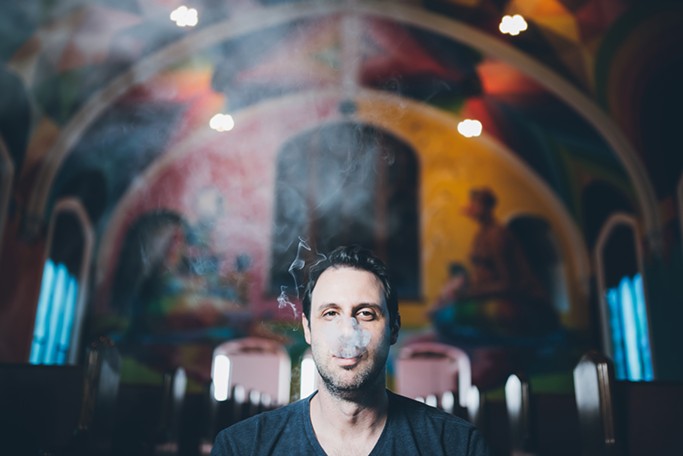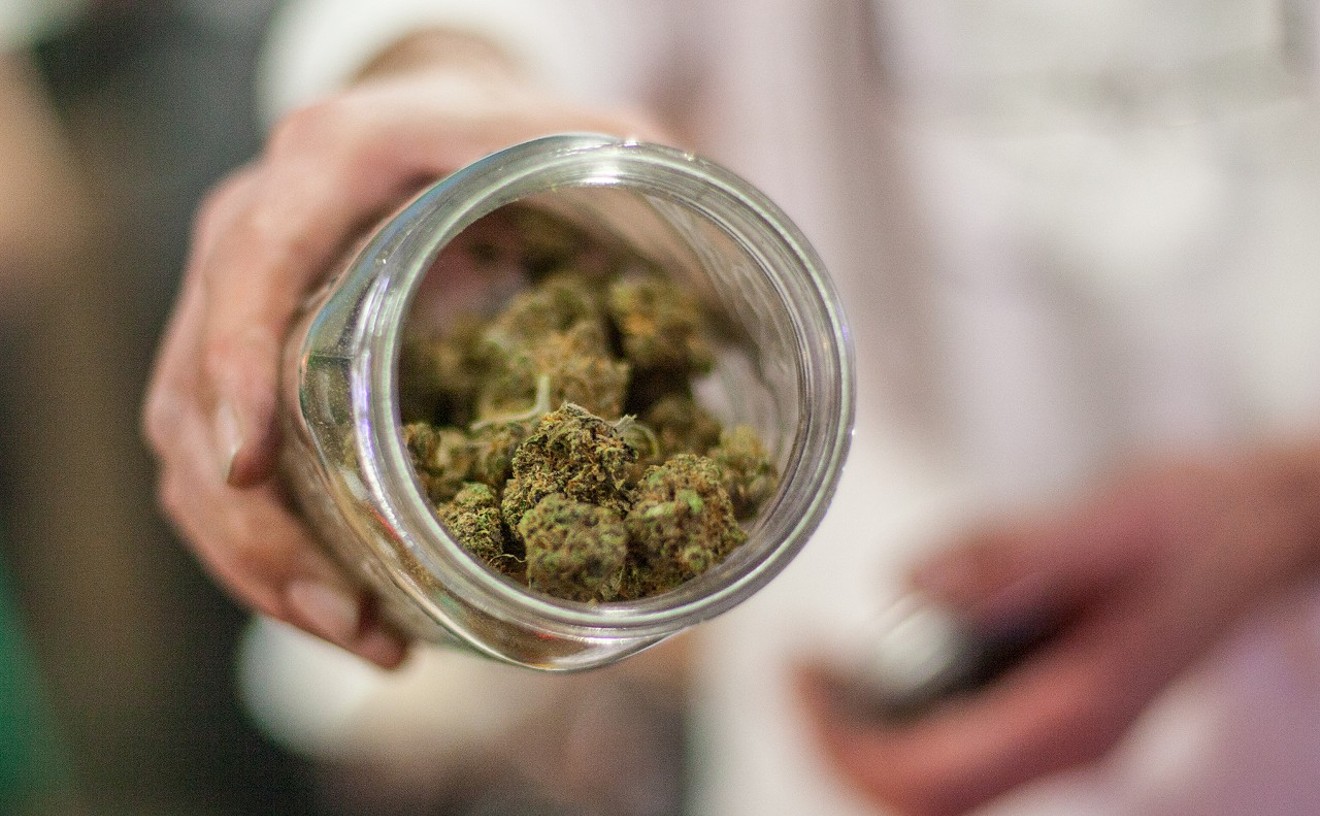Since opening in Denver over three years ago, the International Church of Cannabis has received regular media and tourism attention for its artful display and occasional weed-friendly attitude. Yet the church's practicing religion, a form of pot-friendly spirituality called Elevationism, has received little spotlight.
So what happens at 400 South Logan Street when the Elevationists gather? For church members and married couple Samantha and Tyler Prock, it's about using the plant to help connect with their community and spirituality. Both Procks were raised Methodist in east Texas with little religious diversity, and they felt welcomed by the church's regular member gatherings, which allow cannabis use when the doors are closed to the public.
"Either you're Christian or you don’t have a place to go," Tyler recalls of their upbringing. "It’s probably gotten better since when we grew up in the ’90s and early 2000s, but it was ‘my way or the highway.’"
The Procks joined the Church of Cannabis shortly after its opening in 2017. Although anyone can practice Elevationism, only church members who are at least 21 may attend services and use cannabis in a social setting. The Procks feel that through their membership, they have reconnected to religion after their disillusionment with religious culture in Texas.
“I feel cannabis brought us back to our spirituality, whereas growing up in east Texas, being like Republican Jesus, it kind of turned us away from religion and spirituality,” Samantha says.
The Procks consider themselves cannabis refugees, moving to Colorado from Texas to legally use cannabis, which they say is for a long list of various medical purposes. The couple says they've faced criticisms from relatives about joining the church, though, with comments ranging from dismissive to a full damnation. However, they hope that their everyday use of cannabis will change their relatives' opinions going forward.
The Procks' story has similarities to those of other church members, most of whom see cannabis as way to connect with others as well as a higher a power. However, the church sees more tourists come through its doors than practicing Elevationists.
A popular destination for art lovers, the 113-year-old church is adorned with a mural by Kenny Scharf on the outside, while visitors are greeted by colorful floor-to-ceiling murals by Okuda San Miguel; there is also a nostalgia-filled recreation room with arcade games, pop art and merchandise. TripAdvisor currently lists the church with a five-star rating, touting light shows, meditation classes and pop-up markets as regular occurrences before the COVID-19 pandemic. (Cannabis consumption is banned to the public at the church, and can only take place during private member meetings and ceremonies.)
The art at the International Church of Cannabis, none of which features cannabis references, is consistent with the goals of Elevationism’s founders, who want to reimagine dogmatic religions while creating a sense of community in their house of worship, according to co-founder Steve Berke.
You don't need to belong to the International Church of Cannabis to be an Elevationist, but you do if you want to partake in the plant there. As Berke emphasizes, the ritual use of cannabis to reach “a better version of self” existed long before he and a group of friends opened the church. There are very few rules, rituals or symbols in Elevationism, he explains, which is by design; the founders want to keep the religious overtones light. Broad-stroke terms like “elevated state” and “universal creative force” allow individual members to tailor their religious experiences to themselves, Berke adds.
The Internal Revenue Service recognizes Elevationism, so the International Church of Cannabis is a religious tax-exempt organization. "It's a simplified religion when it comes to ritual and rules, because we wanted to reject some of the aspects of organized religion that the co-founding members really hated," Berke explains.
Berke's family purchased the building initially. An entrepreneur, part-time comedian and two-time mayoral candidate of Miami Beach, Florida, Berke insists the church was founded for community purposes, and not promotional reasons, but the church has received a fair share of attention from the media and local law enforcement since opening. Berke's fight with the Denver Police Department over alleged public pot consumption during a 4/20 party in 2017 dragged through the local court system for over two years, with Berke, the church and his fellow co-founders the subject of national media coverage during that span.
According to Berke, many members use Elevationism as a supplemental religion, and the only rule is the golden rule: Treat others how you would like to be treated. “We do have Elevationist Christians and Elevationist Buddhists, but we also have Elevationist atheists and agnostics,” Berke says. “Why can’t we have a spiritual community without an authoritarian structure or telling people what to do?”
Because Elevationism takes on different meanings for different members, characterizing the religion is near impossible — but that’s kind of the point, according to members. Ritual and church services, typically held once or twice a week, are used to assist members in finding their way to elevated states of being. (Since the COVID-19 pandemic began, the congregation no longer meets in person, but has virtual services over Zoom and Facebook Live.)
During in-person rituals, members light their cannabis from the same candle. Every service opens with the ritual and consumption of cannabis while the Elevationist meditation is recited. “We give thanks to the original energy of creation. We light this candle to celebrate our freedom to elevate, and remember those not at liberty to join us. We support each other on our individual spiritual journey, and welcome all as family in love and in peace to burn their sacrament with us today,” the meditation goes.
The novel part of the International Church of Cannabis is the ritual use of marijuana, or “the sacrament,” as members call it. Berke emphasizes that members are not required to consume cannabis, but that many choose to do so as a way of reaching a state of elevation.
In an April virtual service, co-founder Adam Mutchler explained to viewers that the opening meditation and cannabis consumption helps “clear your head to kind of get into the right setting to really have some interesting conversations and thoughts about the world, yourself and what you’re doing with yourself.”
Stemming in part from the skepticism of traditional religion, Elevationism encourages practitioners to broaden their perspectives and look critically at the world. Sunday services usually feature a wide range of guest speakers, including tech CEOs, college professors, filmmakers, musicians, artists and congregation members discussing their personal experiences. After virtual and in-person services, church members then engage in a discussion of the service; Berke says that the church provides snacks after in-person services, as sacrament consumption tends to make members hungry.
To those on the outside, that may seem like smoking pot with friends and nursing the munchies, but practicing Elevationists like the Procks have a much deeper experience by reaching an “elevated state."
"My mind has taken a step away from this reality a little bit. You’re calm, you’re happy, you have an easier and direct connection with the divine,” Tyler says.
For Samantha, it brings clarity. To her, the ritual lighting of the candle and subsequent lighting of cannabis from the flame evokes fellowship. "We are all that same flame," she concludes.
[
{
"name": "Air - MediumRectangle - Inline Content - Mobile Display Size",
"component": "12017618",
"insertPoint": "2",
"requiredCountToDisplay": "2",
"watchElement": ".fdn-content-body",
"astAdList": [
{
"adType": "rectangle",
"displayTargets": "mobile"
}
]
},{
"name": "Editor Picks",
"component": "17242653",
"insertPoint": "4",
"requiredCountToDisplay": "1",
"watchElement": ".fdn-content-body",
"astAdList": [
{
"adType": "rectangle",
"displayTargets": "desktop|tablet"
},{
"adType": "rectangle",
"displayTargets": "desktop|tablet|mobile"
}
]
},{
"name": "Inline Links",
"component": "18838239",
"insertPoint": "8th",
"startingPoint": 8,
"requiredCountToDisplay": "7",
"maxInsertions": 25
},{
"name": "Air - MediumRectangle - Combo - Inline Content",
"component": "17261320",
"insertPoint": "8th",
"startingPoint": 8,
"requiredCountToDisplay": "7",
"maxInsertions": 25,
"watchElement": ".fdn-content-body",
"astAdList": [
{
"adType": "rectangle",
"displayTargets": "desktop|tablet"
},{
"adType": "rectangle",
"displayTargets": "desktop|tablet|mobile"
}
]
},{
"name": "Inline Links",
"component": "18838239",
"insertPoint": "8th",
"startingPoint": 12,
"requiredCountToDisplay": "11",
"maxInsertions": 25
},{
"name": "Air - Leaderboard Tower - Combo - Inline Content",
"component": "17261321",
"insertPoint": "8th",
"startingPoint": 12,
"requiredCountToDisplay": "11",
"maxInsertions": 25,
"watchElement": ".fdn-content-body",
"astAdList": [
{
"adType": "leaderboardInlineContent",
"displayTargets": "desktop|tablet"
},{
"adType": "tower",
"displayTargets": "mobile"
}
]
}
]












